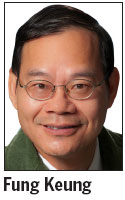Stop the 'dirty-money' business escalating in Hong Kong
Updated: 2013-03-12 05:33
By Fung Keung(HK Edition)
|
|||||||
Casinos in Macao have been reportedly used for years as conduits for money-laundering by corrupt mainland officials. After taking over the helm as China's top leader, Xi Jinping has sworn to clamp down on graft in government and prosecute officials who are on the take. A visit by Wu Bangguo, chairman of the Standing Committee of the National People's Congress, to Macao shortly after Chinese New Year sent Macao gaming stocks tumbling in Hong Kong trading.
I now fear that some of the "dirty money" originally destined for Macao casinos is heading our way.
Money-laundering in Hong Kong already is notorious. The crackdown in Macao is likely to make things worse for this financial center. The government's Joint Financial Intelligence Unit reported last month that the number of money-laundering cases jumped by 15 percent in 2012 compared with 23,282 cases the previous year. The figure also doubled that of 11,687 cases recorded in 2003.
The "dirty money" involved in last year's cases totaled HK$768.50 million - up 5 percent from 2011 and seven times the HK$106.5 million uncovered in 2003. The trend is worrying, to say the least. I'm sure many "clever deals" involving millions of Hong Kong dollars have evaded regulatory bodies' radar.

We can't afford to turn a blind eye to such a worsening situation. The government should devote more resources to tackle the "dirty money" business to retain Hong Kong's clean reputation as a world city and a major business center.
Britain's biggest bank HSBC agreed to pay a $1.9 billion fine last December to settle allegations by US regulators that it allowed itself to be used to launder billions of dollars for drug barons and potential terrorists.
Just imagine that if one of the world's biggest banks was perceived to be involved in money-laundering, little needs to be said about smaller banks in Hong Kong. They are already in a less advantageous position when vying for business with the big banks. Hong Kong's banking does have room for perfection. The extent of "dirty-money washing" is believed to be wider than what people already know.
With an overflowing budget surplus, the government can afford to spend more money to beef up the police's commercial crime and Customs units. Universities' criminology programs can emphasize more on fighting commercial crime (including money-laundering detection skills) to nurture a new breed of professionals to fight money laundering.
The government has advertized to recruit a senior brand executive (with a monthly salary of HK$55,850) to promote Hong Kong's image. We already have an adequate number of foreign visitors every year. Hong Kong is a tourist hot spot. We don't need to tell the world we are a tourist destination and shopping paradise. The money can be well spent on recruiting specialists to fight "dirty-money washing" in order to protect Hong Kong's image as a clean financial center. If such an image is tarnished, it would be hard to clean it.
Meanwhile, many commercial crime police officers have been lured to work for the private sector. The government should devise some stop-gap plans to retain experts and stop the "brain drain". It is reported that these former policemen make between HK$1 million and HK$2 million a year working for private banks.
Rather than slighting the hot issue of money laundering, Chief Executive Leung Chun-ying and his deputies are well advised to nip them in the bud the growing number of money-laundering cases in Hong Kong.
The author is coordinator of the B.S.Sc in financial journalism program at Hong Kong Baptist University.
(HK Edition 03/12/2013 page1)